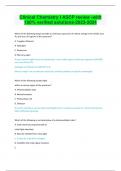Ascp chemistry review - Study guides, Class notes & Summaries
Looking for the best study guides, study notes and summaries about Ascp chemistry review? On this page you'll find 114 study documents about Ascp chemistry review.
Page 4 out of 114 results
Sort by
Clinical Chemistry I ASCP review -with 100% verified solutions-
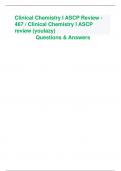
-
Clinical Chemistry I ASCP Review - 467 / Clinical Chemistry I ASCP review (youlazy) Questions & Answers
- Exam (elaborations) • 205 pages • 2024
-
- $13.99
- + learn more
Clinical Chemistry I ASCP Review - 467 / Clinical Chemistry I ASCP review (youlazy) Questions & Answers Which of the following lamps provides a continuous spectrum of radiant energy in the visible, near IR, and near UV regions of the spectrum? A. Tungsten-filament B. Hydrogen C. Deuterium D. Mercury vapor - CORRECT ANSWER-A most common light source for photometry in the visible region. continuous spectrum (360-800 nm). near IR and UV. Hydrogen and Deuterium (200-375 nm) Mercury vapor- no...
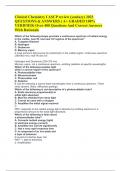
-
Clinical Chemistry I ASCP review (youlazy) 2023 QUESTIONS & ANSWERS ( A+ GRADED 100% VERIFIED) Over 400 Questions And Correct Answers With Rationale
- Exam (elaborations) • 88 pages • 2023
- Available in package deal
-
- $13.49
- + learn more
Clinical Chemistry I ASCP review (youlazy) 2023 QUESTIONS & ANSWERS ( A+ GRADED 100% VERIFIED) Over 400 Questions And Correct Answers With Rationale Which of the following lamps provides a continuous spectrum of radiant energy in the visible, near IR, and near UV regions of the spectrum? A. Tungsten-filament B. Hydrogen C. Deuterium D. Mercury vapor A most common light source for photometry in the visible region. continuous spectrum (360-800 nm). near IR and UV. Hydrogen and Deuterium...
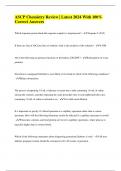
-
ASCP Chemistry Review | Latest 2024 With 100% Correct Answers
- Exam (elaborations) • 5 pages • 2024
-
- $10.58
- + learn more
Which troponin protein binds the troponin complex to tropomyosin? - Troponin T (TnT) If there are 25g of NaCl per liter of solution, what is the molarity of the solution? - 0.43M All of the following are primary functions of the kidney, EXCEPT? - Reabsorption of waste products Elevation in conjugated bilirubin is most likely to be found in which of the following conditions? - Biliary obstruction The process of pipetting 1.0 mL of plasma or serum into a tube containing 1.0 mL of saline, mi...
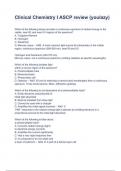
-
Clinical Chemistry I ASCP review (youlazy) QUESTIONS & ANSWERS ( A+ GRADED 100% VERIFIED)
- Exam (elaborations) • 100 pages • 2023
- Available in package deal
-
- $9.99
- + learn more
Clinical Chemistry I ASCP review (youlazy) QUESTIONS & ANSWERS ( A+ GRADED 100% VERIFIED) Which of the following lamps provides a continuous spectrum of radiant energy in the visible, near IR, and near UV regions of the spectrum? A. Tungsten-filament B. Hydrogen C. Deuterium D. Mercury vapor - ANS A most common light source for photometry in the visible region. continuous spectrum (360-800 nm). near IR and UV. Hydrogen and Deuterium (200-375 nm) Mercury vapor- not a continuous spect...
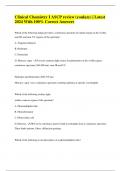
-
Clinical Chemistry I ASCP review (youlazy) | Latest 2024 With 100% Correct Answers
- Exam (elaborations) • 173 pages • 2024
-
- $11.99
- + learn more
Which of the following lamps provides a continuous spectrum of radiant energy in the visible, near IR, and near UV regions of the spectrum? A. Tungsten-filament B. Hydrogen C. Deuterium D. Mercury vapor - A most common light source for photometry in the visible region. continuous spectrum (360-800 nm). near IR and UV. Hydrogen and Deuterium (200-375 nm) Mercury vapor- not a continuous spectrum, emitting radiation at specific wavelengths Which of the following isolates light within a na...
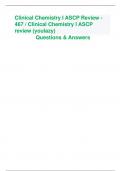
-
Clinical Chemistry I ASCP Review - 467 / Clinical Chemistry I ASCP review (youlazy) Questions & Answers Which of the following lamps provides a continuous spectrum of radiant energy in the visible, near IR, and near UV regions of the spectrum? A. Tungsten
- Exam (elaborations) • 205 pages • 2024
-
- $12.49
- + learn more
Clinical Chemistry I ASCP Review - 467 / Clinical Chemistry I ASCP review (youlazy) Questions & Answers Which of the following lamps provides a continuous spectrum of radiant energy in the visible, near IR, and near UV regions of the spectrum? A. Tungsten-filament B. Hydrogen C. Deuterium D. Mercury vapor - CORRECT ANSWER-A most common light source for photometry in the visible region. continuous spectrum (360-800 nm). near IR and UV. Hydrogen and Deuterium (200-375 nm) Mercury vap...
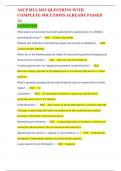
-
MT/MLT/ASCP MLS BUNDLED EXAMS| DOWNLOAD TO SCORE A+
- Package deal • 10 items • 2024
-
- $45.49
- + learn more
AAB MT HEMATOLOGY REVIEW AAB MT MICROBIOLOGY ASCP Study Guide (MLT) MLT ASCP REVIEW 5 MLT LICENSE EXAM ASCP MLS 2023 ASCP MLS STUDY GUIDE: CHEMISTRY ASCP PHLEBOTOMY ASCP recalls (UPDATED) MEDICAL LABORATORY SCIENCE REVIEW- HARR – IMMUNOLOGY
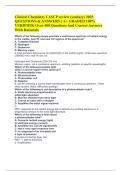
-
Clinical Chemistry I ASCP review (youlazy) 2023 QUESTIONS & ANSWERS ( A+ GRADED 100% VERIFIED) Over 400 Questions And Correct Answers With Rationale
- Exam (elaborations) • 88 pages • 2023
-
- $13.49
- + learn more
Clinical Chemistry I ASCP review (youlazy) 2023 QUESTIONS & ANSWERS ( A+ GRADED 100% VERIFIED) Over 400 Questions And Correct Answers With Rationale Which of the following lamps provides a continuous spectrum of radiant energy in the visible, near IR, and near UV regions of the spectrum? A. Tungsten-filament B. Hydrogen C. Deuterium D. Mercury vapor A most common light source for photometry in the visible region. continuous spectrum (360-800 nm). near IR and UV. Hydrogen and Deuterium...
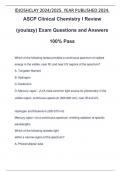
-
ASCP Clinical Chemistry I Review (youlazy) Exam Questions and Answers 100% Pass
- Exam (elaborations) • 186 pages • 2024
- Available in package deal
-
- $11.49
- + learn more
ASCP Clinical Chemistry I Review (youlazy) Exam Questions and Answers 100% Pass Which of the following lamps provides a continuous spectrum of radiant energy in the visible, near IR, and near UV regions of the spectrum? A. Tungsten-filament B. Hydrogen C. Deuterium D. Mercury vapor - A most common light source for photometry in the visible region. continuous spectrum (360-800 nm). near IR and UV. Hydrogen and Deuterium (200-375 nm) Mercury vapor- not a continuous spectrum, emitting ra...

How did he do that? By selling his study resources on Stuvia. Try it yourself! Discover all about earning on Stuvia

